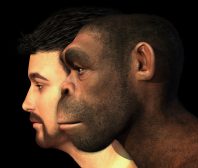Definition
noun, plural: metatherian mammals
Any from the group of mammals possessing choriovitelline type of placenta (as opposed to other mammalian groups) and give birth to live but a highly altricial young that needs further nourishment in the mother’s pouch or marsupium
Supplement
Mammals are all those animals that give birth and nourish their newborn with milk through mammary glands. Based on placentation, they are grouped into three: (1) prototherians, (2) metatherians, and (3) eutherians.
Metatherian mammals differ from the other mammalian groups in having a choriovitelline placenta. In this type of placenta, a vitelline membrane surrounds the embryo rather than allantoic membrane (compare: eutherian mammal). Not like the chorioallantoic placenta in eutherians, the choriovitelline placenta provides no direct contact between maternal and fetal circulation. Thus, nutrients from the mother’s uterine nutritive fluid diffuse into the yolk sac.
Examples of metatherian mammals include kangaroos and opossums.
Word origin: Greek meta (changed) + thērion (beast)
Synonym(s):
- metatherian
Compare:
Related term(s):
- Metatheria
See also:







